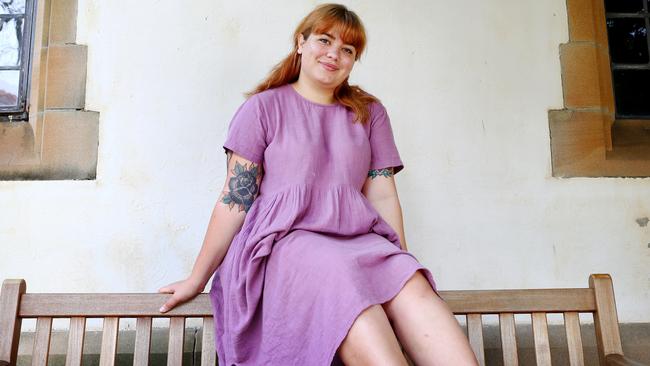Arndt student protester suspended
A Uni of Sydney student at the centre of a protest outside a lecture by Bettina Arndt is suspended.

A student activist at the centre of a rowdy protest outside a lecture by author and social commentator Bettina Arndt at the University of Sydney has been suspended over the incident, calling into question the organisation’s bid to play down the incident and dismiss claims of a free speech crisis.
Madeline Ward has been hit with a “suspended suspension” from her studies following a nine-month investigation into the incident, which took place outside Ms Arndt’s controversial “Fake Rape Crisis Tour” event last year.
While the university has previously declined to provide details of findings against individual students for privacy reasons, Ms Ward told The Australian that she had been found guilty of breaching the student code of conduct by “unreasonably impeding access to a lecture theatre” and failing to treat members of the public with “respect, dignity, impartiality courtesy and sensitivity”.
Given the 22-year-old had already been sanctioned with a suspended suspension over a prior incident of political activism, the latest penalty automatically converted to a full suspension that will result in her being sidelined during semester one in 2020.
Ms Ward has spoken out about her “severe penalty” in an article published in literary journal Overland, in which she questions the veracity of the university’s claim to support “the right to free speech for all”, including students’ right to protest.
“Any encouragement of freedom of speech and protest on campus can hardly be considered sincere when the organiser of the protest in question is facing a suspension,” she wrote.
The protest last September sparked intense public debate about threats to freedom of speech at Australian universities, including concerns activist students were seeking to silence, or “de-platform”, unpopular views.
Ms Arndt had been invited by the Sydney University Liberal Club to share her views denouncing the common perception that sexual assault was rampant across university campuses. However, campus security called local police to help disperse dozens of students who were blocking ticketholders from entering the venue.
Police from the riot squad, who were nearby and heard about the incident on the radio, also attended. Ms Arndt later lodged a complaint.
Despite this, the incident, which served as catalyst for the government to order a review into freedom of speech, was dubbed “a little student protest” of a “slightly dull talk” by Sydney vice-chancellor Michael Spence.
In a report summarising the investigation, the university’s acting registrar, Peter McCallum, described the Arndt event and the protest as “legitimate expressions” of free speech.
“Any findings made in this case are not in any way intended to discourage free speech or protest,” said Associate Professor McCallum. “They relate solely to matters of public safety and impeding others from participating in events on campus.”
Ms Ward said she would appeal against her suspension.
“I know I’m controversial and have quite left-wing views, but there’s a real hypocrisy occurring,” she said.
“I do worry about the impact on other students because the code of conduct is impeding on students’ freedom of speech in an invasive and punitive way.”
Ms Arndt welcomed news of the suspension.
A university spokeswoman confirmed that the student code of conduct, which was last revised in 2005, was being reviewed.



To join the conversation, please log in. Don't have an account? Register
Join the conversation, you are commenting as Logout